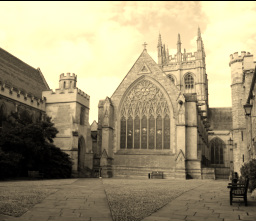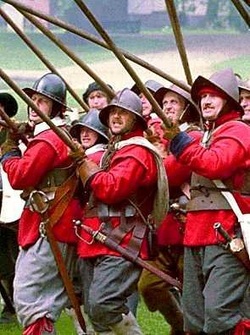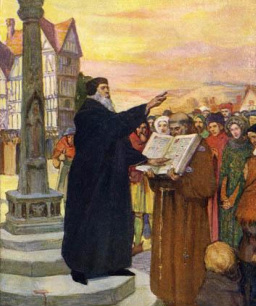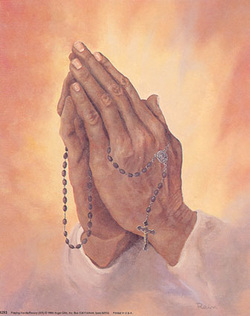John Wycliffe

Merdon College of Oxford
Early Life
John Wycliffe was born between 1320 and 1330 A.D. in Yorkshire, England. His family was very large and covered lot of territory. However, he was not related to anyone else that made a significant impact on history. As a child he was trained by a village priest for service in the church. At the age of thirteen he enrolled in Merton College of Oxford, and he became a doctor of theology in 1372.
John Wycliffe was born between 1320 and 1330 A.D. in Yorkshire, England. His family was very large and covered lot of territory. However, he was not related to anyone else that made a significant impact on history. As a child he was trained by a village priest for service in the church. At the age of thirteen he enrolled in Merton College of Oxford, and he became a doctor of theology in 1372.
At That Time

The Peasant's Revolt
Many traumatic events were occuring in England, as well as across Europe, during the time John Wycliffe lived.This string of devastating events began with the Black Death. The Black Death was a terrible plague that spread across Europe, and it is thought to have killed nearly one third of the population. During the same time frame was the One Hundred Years War. This war between France and England drained money and resources, leading to economic distress. The economic distress caused peasants to become even more poor, and begin to starve. This caused the Peasants's Revolt in 1381. The Peasant's Revolt was when an army of peasants launched a series of revolts around England, then captured the Tower of London. All throughout these occurences the Church was becoming more and more corrupt. Leaders in the Church often advanced due to political influence, and some simply bought their way in. This was also the time when the Great Schism occured, which was when two opposing priests fought eachother for the Papal throne. The Middle Ages was definitely a difficult time to live through.
Major Events in John's Life and Death

John Wycliffe preaching
John Wycliffe had a very eventful life, and accomplished a lot throughout it. His first major accomplishment was in 1365 when he was sent by Parliament to the Netherlands with papal representatives. He was sent because Parliament knew he had previously been in a debate over the subject of the Pope's ideas and intentions. While in the Netherlands John discovered the lies of the Pope and the greedy thoughts behind his actions. Once John returned to England he announced them to the public, which greatly angered Pope Urban V. John Wycliffe's second accomplishement was the preaching he did throughout a large portion of his life. He constantly spread the message that the Church had become corrupt, and that no Pope nor council was infallible. He believed that if anyone's views, even the Pope's views, contradicted the Bible they were wrong. He also taught that the clergy should help the common people and lead them to Christ instead of being princes of the Church. Many people in England began to listen to John Wycliffe, and he picked up many followers. Unfortunately, his preaching came to an end when in 1382 the Bishop of London prohibited him from preaching. His third major accompishment came a few years later, when he translated the entire Bible from Latin to English. Though these were the major accomplishements of John Wycliffe's life, he is also known for what happened to him after his death. He died in 1384 of a stroke, and thrity-one years after this the Church ordered his bones to be dug up and burned. All his books were burned as well. The ahses of his books and his bones were then dumped in the Thames River. John Wycliffe is one of the only people who is just as famous for what he did when he was living as he is for what happened to him after he died.
Impact Then and Now

Praying
John Wycliffe had a huge impact on England at that time, as well as a huge influence on the world today. During his lifetime John had many followers. These followers listened to all his preachings, and believed in all his beliefs. Even after he died his followers continued to spread his message as part of the Protestant Reformation. John is known as the "Morning Star" of the Protestant Reformation because he was the first light, or the first one to have the idea. He laid the foundation for the Protestant Revolution to be continued many years later by Martin Luther. His ideas influenced the Church, and continue to influence the Church today. Now the Bible is no longer printed or recited in Latin. Instead it is in English so everyone can understand it. Also, people can now have a personal relationship with God as John Wycliffe wanted. He was very influential on the Church, and continues to be one of the biggest influences on the Church today.
